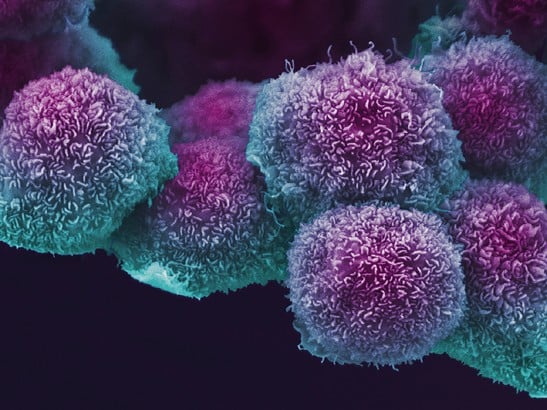Scientists have discovered a key protein that could be targeted with a drug to treat the most common and aggressive form of pancreatic cancer.
The findings, published in Nature, show that blocking the protein SPP1 could stop the spread of the cancer and increase survival time.
More than 10,000 people are diagnosed with pancreatic cancer in the UK each year, and there are more than 9,000 deaths from the disease each year. Survival rates have not shown improvement in the past 50 years – the disease has the lowest survival rates of common cancers. Only five in 100 people will survive for ten years or more.
Pancreatic ductal adenocarcinoma (PDAC) is the most aggressive type of pancreatic cancer, and the most common, accounting for 90 per cent of pancreatic cancers.
A protein associated with worse outcomes
Researchers from The Institute of Cancer Research, London, found that levels of the SPP1 protein were raised in the advanced stages of pancreatic cancer, compared with stage 1 and 2.
Looking at data from 644 patients’ tumours, they found that patients with higher levels of SPP1 had worse outcomes.
The team, funded by The Institute of Cancer Research (ICR) – which is a charity, as well as a research institute – and Breast Cancer Now, grew pancreatic cancer organoids – lab-grown mini tumours designed to model how cancer cells behave in our bodies.
Switching off the protein stops cancer spread
When they switched off the gene to make the SPP1 protein, fewer and smaller tumours developed than when the protein was present.
There were also fewer of the most dangerous cells present – cells with properties that help them invade new tissues and migrate around the body.
In mice with PDAC, switching off the gene significantly extended their survival – none of the mice with the gene survived past 50 days, whereas 20 per cent of the mice without the gene survived to 400 days.
The researchers found that SPP1 also had a profound effect on the ability of the cancer to spread.
The mice with the SPP1 gene switched off had tumours which did not spread at all.
In contrast, 23 per cent of the mice with the SPP1 gene present had cancer that spread to the liver, and 30 per cent had cancer that spread to the lung.
Blocking the protein extends survival
Giving the mice an antibody to target the SPP1 protein also extended survival and prevented cancer spread. Without the antibody, half of the mice survived 30 days – with the antibody, half survived beyond 100 days.
The same team previously identified another protein that could change pancreatic cancer cells into the more aggressive, dangerous type.
When levels of the protein, GREM1, are low, the cells are more likely to spread. Until now, researchers have been searching for a way to boost the levels of GREM1, so that cancer cells remain in the less aggressive, and easier to treat, state.
In the current study, they discovered that SPP1 and GREM1 have directly opposing effects. Blocking SPP1 raises the levels of GREM1, and prevents pancreatic cancer cells from becoming aggressive.
The team hopes this research will pave the way to the development of precise drugs to target SPP1, such as antibodies or small molecule drugs.
'A way to prevent tumours from becoming aggressive'
Professor Axel Behrens, Professor of Stem Cell Biology at The Institute of Cancer Research, London, and Scientific Director of the Cancer Research UK Convergence Science Centre, said:
“A few years ago, we made a fundamental discovery in understanding what drives pancreatic cancer to be able to spread – making it less treatable, and ultimately more dangerous. We’ve been searching for how to harness this information to treat the disease, and I’m incredibly excited that we have now found a way to prevent tumours from becoming aggressive.
“Our research has identified a protein that, when blocked, can prevent cancer from spreading around the body and can hopefully keep patients living well for longer. The next step for this research will be to develop a drug that can precisely target the protein.”
'A clear target to halt the spread of the disease'
Professor Kristian Helin, Chief Executive of The Institute of Cancer Research, London, said:
“Pancreatic cancer remains a devastating diagnosis for patients, as its most common form spreads aggressively, and is difficult to treat.
“This exciting research offers hope, identifying a clear target to halt the spread of the disease. It’s an important step toward more effective treatments, and I look forward to future drug discovery efforts building on these findings to provide new options to patients in urgent need.”
